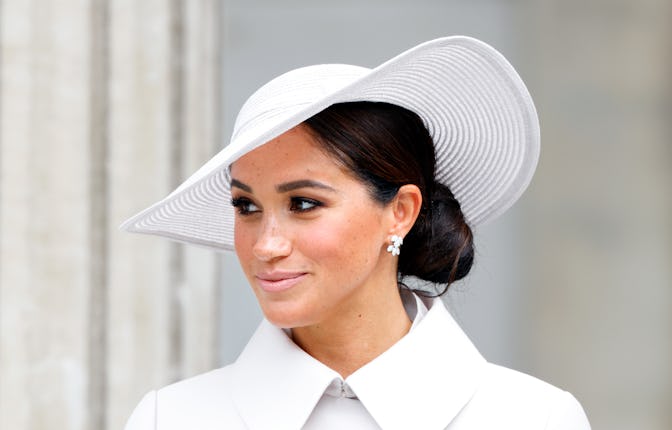Meghan Markle, Issa Rae, and Ziwe tore into the “angry Black woman” stereotype
“You're allowed to set a boundary, you're allowed to be clear.”

Meghan Markle has no problem with getting vulnerable and going deep on Archetypes, her relatively new Spotify podcast — and the latest episode, released Tuesday, is no exception. The Duchess of Sussex centered her seventh episode on an issue Black women have dealt with since the beginning of time — being characterized as the “angry Black woman,” with no real evidence to substantiate the claim — and she invited Insecure and Rap Sh!t creator Issa Rae and comedian and talk show host Ziwe on the show to discuss it.
The “angry Black woman” trope has impacted all three women throughout their lives, at times influencing their communication styles to ensure they’re not being viewed as “bitchy” or “too demanding” when they’re confidently asserting themselves. Put simply, it’s a harmful caricature that shrinks Black women down into one generalized, limiting descriptor.
“You're allowed to set a boundary, you're allowed to be clear. It does not make you demanding; it does not make you difficult.” - Meghan Markle
“I will find myself cowering and tiptoeing into a room — I don't know if you ever do that, the thing that I find the most embarrassing — when you're saying a sentence and the intonation goes up like it's a question,” Markle said to Rae on the podcast. “And you're like, 'Oh my God, stop! Stop whispering and tiptoeing around, and say what it is you need.’”
“You're allowed to set a boundary, you're allowed to be clear,” Markle added during their conversation. “It does not make you demanding; it does not make you difficult. It makes you clear."
Rae echoed Markle’s sentiments, while also sharing that she often feels she isn’t “allowed” to be angry, even when certain moments warrant the emotion. “People are looking for ways to justify their perception of you. That doesn't mean I don't get angry,” Rae said. “That might mean that I will vent my frustrations to someone that I trust, get it out of my system and then go [into] fix mode. And I think even personality wise, I'm always like, I don't want to sit in my anger too long anyway, because what does that do? I want to work on fixing something, but I want to be allowed to have that emotion because it's natural — it's an emotion."
“People are looking for ways to justify their perception of you.” - Issa Rae
As for Ziwe, the host and creator of her namesake Showtime show said she’s worked hard to shatter sexist societal views, citing her onscreen, barrier-breaking persona. "I grew up with culturally conservative parents who had a really strict understanding of women — what women did and how they lived and they cooked and cleaned," she told Markle. "And so, from that understanding, I also exist in society and I know what the expectations are of women there as well. And these things correlate. And so to be the character of Ziwe that is brash, and rude, and thoughtful is in direct opposition to what a woman should be publicly, according to sexism.”
As Markle referenced in the first few minutes of the Archetypes episode, a simple Google search for “why are Black women …” autofills with pejorative adjectives such as “angry” and “mean.” This revelation may be dismissed by some, but in reality, its impact goes beyond the surface. According to a 2014 report published in the journal Social Work in Public Health, it’s imperative that mental health care providers have an understanding of this trope when treating Black women. “Awareness of the angry Black woman mythology, including its genesis, manifestations, and the unique experiences of Black women, may raise the standards of cultural competence for clinicians and provide more successful treatment outcomes in working with this population,” the report noted.